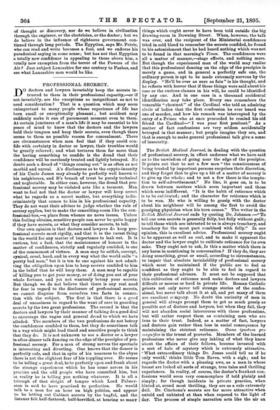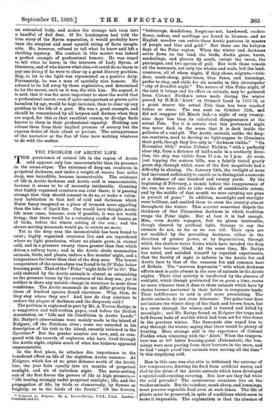PROFESSIONAL SECRECY.
DO doctors and lawyers invariably keep the secrets in- trusted to them in their professional capacity,—or if not invariably, are the exceptions so insignificant as not to need consideration ? That is a question which may seem unimportant to many people whose experience of life has been small or exceptionally pleasant ; but accident may suddenly make it one of paramount moment even to them. At certain junctures of a man's life it may be essential to his peace of mind to know that the doctors and the lawyers hold their tongues and keep their secrets, even though there seems to them no possible reason for concealment. There are circumstances when men feel that if they could con- fide with certainty in doctor or lawyer, their troubles would be greatly relieved ; and what tortures them far more than the having something to confide is the dread that their confidence will be carelessly treated and lightly betrayed. No doubt such a dread of "things coming out" is as often as not morbid and unreal. A's disclosures as to the crypto-insanity of his Uncle James may already be perfectly well known to his neighbours, and B's breach of trust be purely technical and neglectable. In either ease, however, the dread that pro- fessional secrecy may be violated acts like a torment. Men want to feel not that the doctor or lawyer will keep secret what he regards as a secret matter, but everything indis- criminately that comes to him in his professional capacity. They do not want their adviser to judge whether the rule of secresy applies, but to make the consulting-room like the con. fessional-box,—a place from whence no news issues. Unless this feeling obtains, sensitive people can never be quite happy if they have secrets, or what they consider secrets, to tell.
Our own opinion is that doctors and lawyers do keep pro- fessional secrets most rigidly, and that it is the rarest thing in the world for any matter of importance to leak out. It is curious, but a fact, that the maintenance of honour in the matter of confidences, strictly and regularly confided, is one of the commonest of virtues. A man may be selfish, corrupt, cynical, cruel, hard, and in every way what the world calls " a pretty bad man," but it is ten to one against his not admit- ting the obligation upon him to keep secrets confided to him in the belief that he will keep them. A man may be capable of killing you to get your money, or of doing you out of your whole fortune, and yet not wantonly betray your secrets. But though we do not believe that there is any real need for fear in regard to the disclosure of professional secrets, we cannot disguise from ourselves two facts in connec- tion with the subject. The first is that there is a good deal of uneasiness in regard to the want of care in guarding secrets by the two great professions. The second is that the doctors and lawyers by their manner of talking do a good deal to encourage the vague and general dread to which we have alluded. The members of the two professions do not betray the confidences confided to them, but they do sometimes talk in a way which might lead timid and sensitive people to think that they do. It is not unknown to see a doctor or a lawyer in after-dinner talk dancing on the edge of the precipice of pro- fessional secrecy. For a man of strong nerves the spectacle is interesting and diverting. One knows that the dancer is perfectly safe, and that in spite of his nearness to the abyss there is not the slightest fear of his toppling over. He seems to be telling a great deal, to be perfectly open and frank about the strange experiences which he has come across in his practice and the odd people who have consulted him, but in reality he is telling you nothing whatever. It is all a triumph of that sleight of tongue which Lord Palmer- ston is said to have practised to perfection. He would talk to a man for an hour on high politics, and appear to be letting out Cabinet secrets by the bagful, and the listener felt half-flattered, half-horrified, at hearing so mazy things which ought never to have been told outside the big drawing-room in Downing Street. When, however, the talk was over, and the recipient of the Ministerial confidences tried in cold blood to remember the secrets confided, he found to his astonishment that he had heard nothing which was not to be found in that morning's Times. The confidences were all a matter of manner,—stage effects, and nothing more. But though the experienced man of the world may realise that this professional dancing on the edge of the precipice is merely a game, and in general a perfectly safe one, the ordinary person is apt to be made extremely nervous by the display. "He'll be over as sure as fate" is his thought, and he reflects with horror that if these things were said about his case or the curious clauses in his will, he could be identified by any one. And in one case in a thousand accidental identification may take place. Every one remembers the venerable "chestnut" of the Cardinal who told an admiring circle of ladies that the first confession he ever heard was one of murder, and how his remark was interrupted by the entry of a Prince who at once proceeded to remind his old friend the Cardinal—" I was your first penitent." As a matter of fact confessions are very seldom accidentally betrayed in that manner ; but people imagine they are, and that is enough to make general professional talk give a sense of insecurity.
The British Medical Journal, in dealing with the question of professional secrecy, in effect endorses what we have said as to the unwisdom of going near the edge of the precipice. It points out that to not a few men "the consciousness of being trusted by important persons surprises their discretion, and they forget that to give up a bit of a matter of secrecy is to give up the whole ; and to not a few there is the tempta- tion to self-advertisement." No line, it goes on, is to be drawn between matters which seem important and those which seem indifferent. "It is the habit of reticence which is to be cultivated; and the character for reticence which is to be won. He who is willing to gossip with the doctor about his neighbour will be among the first to avoid the gossiping physician when his turn comes." The writer in the British Medical Journal ends by quoting Dr. Johnson :—" To tell our own secrets is generally folly, but folly without guilt; to tell those which are intrusted to us is always treachery, and treachery for the most part combined with folly." In our opinion, this is excellent advice. Professional secrecy ought to be apparent as well as real, and to make it apparent the doctor and the lawyer ought to cultivate reticence for its own sake. They ought not to ask, Is this a matter which there is any harm in mentioning in conversation? If they do, they are doing something, great or small, according to circumstances, to impair that absolute inviolability of professional secrecy which must be maintained if the public are to feel as confident as they ought to be able to feel in regard to their professional advisers. It must not be supposed that this cultivation of reticence need make doctors and lawyers difficult or morose or hard in private life. Roman Catholic priests not only never tell strange stories of the confes- sional, but never talk about it at all, and yet many of them are excellent c( mpany. No doubt the curiosity of men in general will always prompt them to get as much gossip as possible out of doctors and lawyers, but when they fail, they will not abandon social intercourse with those professions, but will rather respect them as containing men who are true to their trust. Indeed, as a matter of fact, lawyers and doctors gain rather than lose in social consequence by maintaining the strictest reticence. Omne ignotum pro magnifico is the truest of proverbs. Members of the learned professions who never give any inkling of what they know about the affairs of their fellows, become invested with a sort of halo of mystery which is extremely attractive. What extraordinary things Dr. Jones could tell us if he only would,' thinks little Tom Eaves, with a sigh; and he regards the doctor with a pleasing awe, as a man in whose breast are locked all sorts of strange, true tales and thrilling experiences. In reality, of course, the doctor's frankest con- fessions would seem very commonplace if told plainly and simply ; for though incidents in private practice, when hinted at, sound most thrilling, they are as a rule extremely dull. Dr. Cinchona's secrets are far more attractive when untold and unhinted at than when exposed to the light of day. The process of simple narration acts like the air on an entombed body, and makes the strange tale turn into a handful of dull dust. If Dr. Lushington had told the true story of the Byron separation, it would probably have been the simplest and most squalid string of facts imagin- able. He, however, refused to tell what he knew and left a thrilling mystery. His conduct in this matter was indeed a perfect example of professional honour. He was urged to tell what he knew, in the interests of Lady Byron, of literature, and of who knows what else,—it could do no harm to any one living if he were to clear up a great literary problem. Nay, to let in the light was represented as a positive duty. Fortunately, he was a man of specially nice honour. He refused to be led away by these sophistries, and determined to let the secret, such as it was, die with him. He argued, it is said, that it was far more important to show the world that a professional secret, even if quite unimportant or grown quite laarmless by age, would be kept inviolate, than to clear up any problem in the life of a poet. His was a great example, and should be remembered by all lawyers and doctors when they are urged, for this or that excellent reason, to divulge facts known to them in their professional capacity. Nothing can release them from their implied promise of secrecy but the express desire of their client or patient. The unimportance of the narrative or the flux of time have nothing whatever to do with the matter.



































 Previous page
Previous page